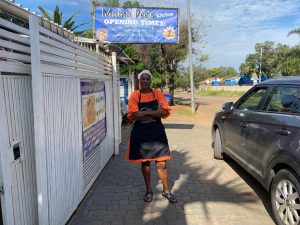Uber and Uber Eats, in commemoration of Women’s Month in South Africa this August, are celebrating two women who have continued to make significant strides in leveraging their association with the Uber brand to thrive in the Digital Economy.
These women have continued to redefine the norm, particularly within historically male-dominated industries. Driven by family hardship, Dimakatso “Mama Dee” Hlongwane built a successful fast-food business from scratch aided by the Uber Eats platform while Sihle Lakhe* went from being inspired by a ride using the Uber app to becoming a successful driver with her own fleet of vehicles, achieving financial freedom.
In 2023, Uber was estimated to have supported R394 million in additional value for the nighttime economy in South Africa. “Uber is committed to empowering women drivers and merchants like Sihle and Dimakatso. We are continuously working with industry partners to help lessen the barriers that exist for women to gain access to equal earning opportunities. We are especially proud to enable women in South Africa by giving them the ability to access new and flexible earning opportunities,” says Cassie Jaganyi, Head of Communications, Uber Sub-Saharan Africa.
Dimakatso Hlongwane, popularly known as Mama Dee, is one such example. Dimakatso is a merchant operating on the Uber Eats app and the founder and owner of Mama Dee’s Fast Food in Danville, Pretoria. She started her eatery as a way to put food on her family’s table after life took an unexpected turn. Faced with her husband’s illness, job loss, and mounting medical bills, Dimakatso took what money she had left and a leap of faith and Mama’s Dee’s was born.
Dimakatso would wake up at the crack of dawn, to prepare amagwinya to sell to her community as they would make their way to work and school. Over time, her customers began to give feedback on other food items they wanted to see on her menu and from this feedback, she started to expand her menu and her business. Through word-of-mouth, Mama Dee’s fast food’s customer base started to expand outside of Danville.
The growing demand gave Dimakatso the idea to join the Uber Eats platform as a merchant. The convenience meant her loyal customers could order more frequently and conveniently, and new customers could now find her. “I always tell people, if you want your business to grow, register on Uber Eats. Because of it, more and more people have learned about my business,” says Dimakatso.
Food delivery apps have transformed how users discover new restaurants, with 88% of Uber Eats app users reporting increased ease in finding new culinary experiences. In 2023, Uber Eats estimated R1,6 billion in additional value was created for restaurants in South Africa, enabling them to leverage delivery as an additional revenue stream. To further spotlight local business, Uber Eats launched the HDP (historically disadvantaged persons) badge to support local businesses by making them easily discoverable, giving eateries like Mama Dee’s Fast Food the opportunity to shine.
Sihle Lakhe, a driver using the Uber app, also attests to the success of women who are leveraging the Uber platform to earn. For Sihle, being a driver on the Uber platform was a great opportunity for her to generate another revenue stream. Currently employed full-time, Sihle was headed to work when her car started having problems. She requested a trip using Uber and little did she know that her ride would inspire her even after the trip ended.
Sihle began the process to become a driver on Uber soon after. “The flexibility meant I could own my time and operate a business when it suited me,” she says. On her first day, she only made R67, but she didn’t give up, and that resilience led to her now making an average of about R12,000 per week. “Uber is strict. After the long vetting and onboarding process, I was initially questioning my decision. But today, I no longer have to borrow money; I now have financial freedom. I do trips in the mornings before work and in the evenings after work,” Sihle added. Sihle now owns two Uber Black vehicles and is working toward purchasing her third.
“Stories like those of Dimakatso and Sihle exemplify the power of technology to empower and unlock economic opportunities for South African women, challenging traditional gender roles and creating new paths to financial independence”, concluded Jaganyi.



